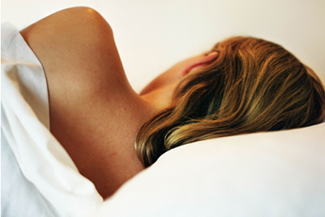How Much Sleep Do I Need?
by Marc David

Let's face it.. sleep is necessary for life!
Better yet, sleep has an increased rate of anabolism (the synthesis of cell structures), and a decreased rate of catabolism (the breakdown of cell structures).
What this means to you is more muscle.
Have you heard the term, "You don't grow in the gym, you grow out of the gym." Well sleep is part of that. It's not just recovery but it's when your muscles repair themselves.
:: Stages of Sleep ::
Currently, scientists divide sleep into two general types: REM (Rapid Eye Movement) and NREM (non-REM).
And within those types, there are 5 defined stages of sleep referred to as Stages 1 thru 5.
Did you know that Non-REM (Stage 1-4 sleep) accounts for 75-80% of total sleep time? it's also in those stages that your body repairs itself and it's when the real growth occurs.
:: Optimal Sleep Amounts ::
An American study linked life spans with sleep amount and found that those who sleep 4 to 7 hours live the longest, with those sleeping less than 4 or more than 9 hours living shorter lives[1]. The National Sleep Foundation however maintains that 8 hours of sleep is optimal, claiming improved performance in tests, reduced risk of accidents and a better immune system. It is important to mention this does not apply to children and adolescents, particularly children who require as much as 13 hours a night.
:: Importance of Optimal Sleep ::
First, some theories of sleep describe sleep as a dynamic time of healing and growth for organisms. For example, during stages 3 and 4, or slow-wave sleep, growth hormone levels increase, and changes in immune function occur.
Non-REM sleep may be an anabolic state marked by physiological processes of growth and rejuvenation of the organism's immune, nervous, muscular, and skeletal systems.
But what happens if you don't get enough sleep?

:: Lack of Sleep ::
This is a list of potential problems associated with a lack of sleep or sleep deprivation.
irritability hernia nausea Decreased ability for the immune system to fight off sickness Weight gain increased blood pressure Aching muscles Faster aging Slowed reaction time dizziness
For all those reasons, you can see that getting enough sleep is EXTREMELY important to your goals of muscle building and fat loss. A lack of sleep can really put a lid on your progress.
Short bouts of sleep deprivation probably won't stifle your gains but long term sleep problems can certainly curtail your progress.
While there is not single number that works for every single person, generally 4-7 hours should be enough for most people under most conditions to build muscle and burn fat.
It's true that some people need more and some people need less.
:: Sleep Tips for Getting the Rest You Need ::
Here's just a few tips for healthy and restful sleep.
Sleep only when sleepy - There's no reason to go to sleep or attempt to sleep if you aren't tired.
If you cannot fall asleep within 20 minutes, get up until you are tired and try again. Don't lie awake for hours.
Nap no more than 20 minutes and certainly not too late in the day as it will interfere with going to sleep later.
Get up and go to bed at the same time every day. This includes weekends. Establish a sleep routine and stick with it.
Refrain from exercising 4 hours before your regular bedtime. You can do morning workouts and late afternoon but if you workout too close to bed time, you've essentially just woken yourself up. It will be harder to go to sleep quickly if you've just got your blood flowing.
Develop sleep rituals. Many parents try and calm their children down 20 minutes or more before bed. This establishes a relaxation time frame before sleeping. Whatever you can do to relax before going to bed.
Only use your bed for sleeping.
Stay away from stimulates 4-6 hours before bed. That includes alcohol, nicotine and caffeine.
Have a light snack before bed.
Take a hot bath 90 minutes before bed. Some studies have shown that a drop in body temperature will leave you feeling sleepy. The bath will warm you up and getting out will cool you down. That drop can leave you feeling ready to sleep and it's a relaxing ritual as well before heading off to bed. A hot/warm shower will also do the trick.
Ensure your bed and bedroom are quiet and comfortable. This means the place where you sleep is conducive to sleeping.
One sleep "secret" action you can take within 45 seconds of opening your eyes in the morning, to instantly raise your energy is to use sunlight to set your biological clock. When light hits your skin, it starts to destroy melatonin. The faster you can get rid of melatonin, the less groggy you will feel upon waking. The first 15 seconds you can either open up a window and get some sunlight or you can look near a bright light if it's too dark outside. This will help to wake you up quickly and get rid of that groggy feeling you sometimes can feel.
Needless to say...
Sleep is extremely important to getting the most of our your fitness program. There's several benefits to sleep beyond the simple fact it's required for life. There's long term effects of sleep deprivation that will interfere with your goals.
Clearly when you sleep, your body is growing and repairing form the workout you did to stimulate muscle growth. This means it is critical to your overall progress.
About The Author:
 Marc David is an innovative fitness enthusiast and the creator of the "The Beginner's Guide to Fitness And Bodybuilding" method on www.Beginning-Bodybuilding.com. He can show you how to reduce your body fat thru diet, how to gain weight or create more muscle thru an abundance of workout tips by training LESS! Not more. He dispels many "bodybuilding myths", tells you what most people never realize about nutrition, and what the drug companies DON'T WANT YOU to know. Go to: http://www.Beginning-Bodybuilding.com to find out more about The Beginner's Guide to Fitness And Bodybuilding.
Marc David is an innovative fitness enthusiast and the creator of the "The Beginner's Guide to Fitness And Bodybuilding" method on www.Beginning-Bodybuilding.com. He can show you how to reduce your body fat thru diet, how to gain weight or create more muscle thru an abundance of workout tips by training LESS! Not more. He dispels many "bodybuilding myths", tells you what most people never realize about nutrition, and what the drug companies DON'T WANT YOU to know. Go to: http://www.Beginning-Bodybuilding.com to find out more about The Beginner's Guide to Fitness And Bodybuilding.
More Articles by Author Marc David
Return to the Workout Articles Archive
|